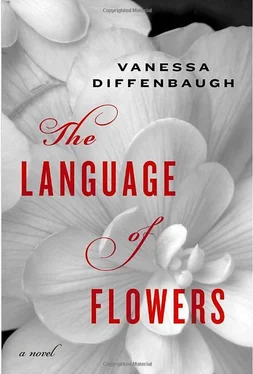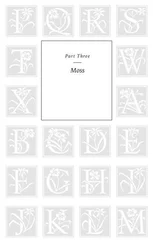When I finished eating, the chicken on the silver platter was a statue of bones. I looked at Grant’s plate. It was hard to tell if he’d eaten anything. I hoped so. I hoped I hadn’t devoured the entire bird. But when he asked me if I wanted to see Hazel’s room, and I tried to stand up, I felt the weight of the meat inside me. I let Grant half-carry me up the stairs. He opened the last door in the long hallway and helped me to the edge of a twin bed. I lay down. Grant picked up my head and placed a pillow beneath my neck. He crossed in front of a rocking chair and pulled a pink leather scrapbook off a bookshelf.
“Elizabeth made this for her,” he said, opening the book. The first page held a picture of a hazel blossom that Catherine had drawn. It had been pulled from its file, laminated with clear plastic, and secured to the album with gold photo corners. Below the drawing was my daughter’s name, Hazel Jones-Hastings, in Elizabeth’s elegant script, and her birthday, March 1, which wasn’t her birthday at all. He turned the page.
In a mounted photograph, Hazel lay in her moss-lined basket, exactly as I had left her. It made my stomach churn, my eyes well, to remember my love for her in that moment, overwhelming and incapacitating. On the next page, Hazel’s head pressed against Grant’s chest in a baby carrier, a floppy white hat tied under her chin. She was asleep. There were two or three photos from each month of her life, her first smile and first teeth and first food all captured with loving attention.
I closed the book and handed it back to Grant. It was everything I had wanted to know.
“This is her room?” I asked.
“When she visits,” he said. “Saturday afternoons, usually, or after the farmers’ market on Sundays.” He ran his hand along the railing of an empty crib as he returned the photo album to its shelf. When he lay down next to me, his body was hot where it touched my arm.
I looked around the room. Catherine’s floral drawings, one-foot graphite squares, hung in thick white mats with pink wooden frames. The frames matched the pink furniture: the crib, a rocking chair, a nightstand, and a bookshelf, all stenciled with white daisies.
“The house looks good,” I said. “You’ve done so much in a year.”
Grant shook his head. “A year and a half,” he said. “I started the day after I showed you my mother’s art studio. Afternoons you worked late, I’d rush home to peel wallpaper, refinish the floors. I wanted it to be a surprise. I hoped someday we’d live here together.”
I’d left without saying goodbye, without even telling Grant I was pregnant. And all the while, he’d been building me a home, never knowing if or when I would return.
“I’m sorry,” I said. In the silence that followed, I remembered the early months of my pregnancy, sleeping for the second time in McKinley Square, nauseated, dirty, and disheveled. The image made me uncomfortable. I’d been in shock to the point of fearlessness, all sense of self-preservation gone.
“I’m sorry, too,” Grant said.
I peeled away from him and looked into his eyes. He was talking about our daughter, her room, empty, surrounding us.
“You gave her away?” I asked. It wasn’t an accusation, and for once the tone of my voice communicated what I wanted to say, that my curiosity was blameless and all-consuming.
Grant nodded. “I didn’t want to. I loved her the moment I saw her. I loved her so much I forgot to eat and sleep and tend my flowers for the entire month of March.” So it had been the same for Grant, I thought: too much.
He turned toward me, his thick body wedged between the wall and my side. “I wanted so much to make her happy,” he said. “But I kept making mistakes. I’d feed her too much or forget her diapers or leave her too long in the sun while I worked. She never cried, but the guilt kept me up at night. I thought I was letting her down, and you, too. I couldn’t be the father I wanted to be, not alone, not without you. And I was afraid, even as I named her, that you weren’t ever coming back.”
Grant lifted a heavy hand and ran it through my hair. He pressed his cheek into my scalp, and I felt his unshaven jawbone tickle my skin. “I took her to Elizabeth,” he said. “It was the only thing I could think of to do. When I showed up on her front porch with the baby in the basket, she cried and took us into her kitchen. I didn’t leave her home for two weeks, and when I did, I didn’t take the baby with me. Hazel smiled for the first time in Elizabeth’s arms; I couldn’t bear the thought of separating them.”
Grant wrapped his arms around me and leaned his face into my ear. “Maybe it was just my excuse for leaving her,” he whispered. “But I couldn’t do it.”
I slipped my arm under his chest. When he squeezed me to him, I squeezed back.
“I know,” I said. I couldn’t do it, either, and he knew it without me having to say it. We held on to each other as if we were drowning, neither looking for shore, and we stayed that way a long time, not talking, barely breathing.
“You told Elizabeth about me?” I asked.
Grant nodded. “She wanted to know everything. She thought I should be able to recite every moment of every day you’d lived since the last time she saw you in court, and kept getting frustrated when I couldn’t.” Grant told me about sitting at Elizabeth’s table, a pot roast in the oven, Hazel asleep in his arms. Why didn’t you ask? she would say, when Grant didn’t know what I’d done for my sixteenth birthday, if I’d gone to high school, or what I liked best for breakfast. “She laughed when I told her you don’t like lilies, and she told me you don’t much care for cactus, either.” I pulled my face out of Grant’s chest to look at him. The corner of his mouth turned up, and I knew he had heard the whole story.
“She told you everything?” I asked. Grant nodded. I dropped my head back down, speaking my next words into his chest. “Even about the fire?”
He nodded again, his chin pressing into my forehead. We were quiet for a long time. Finally, I asked the question I had long held. “How could you have not known the truth?”
Grant didn’t answer right away. When he did, the words came out with a long sigh. “My mother’s dead.”
I believed his statement to signal an end to my questioning, and did not press. But after a pause, he continued.
“It’s too late to ask her. But I think she thought she lit the fire. By that time, she didn’t recognize me most days. She was forgetting to eat, refusing her medicine. The night of the fire, I found her in her studio, watching. Tears streamed down her face. She began to cough spastically, and then choke, as if she had smoke in her lungs. I went to her, put my arms around her shoulders. She felt so small. I’d probably grown a foot since the last time I’d been in her arms. Between sobs, she muttered the same sentence, over and over again: I didn’t mean to do it. ”
I imagined the purple sky, Catherine and Grant’s silhouette in the window, felt the return of the despair I’d experienced in the heat of the fire. Catherine had felt it, too. In that moment, we were the same, each of us destroyed by our limited understanding of reality.
“And after?” I asked.
“She spent a year drawing hyacinth; in pencil, charcoal, ink, pastel. Finally, she began to paint, on everything from huge canvases to tiny postage stamps, tall purple stalks with hundreds of small blossoms. All for me, she said. Not one was good enough for Elizabeth. Every day, she tried again.”
Hyacinth. Please forgive me . I remembered the jars of purple paint on the top shelf of Catherine’s studio.
“It was a good year,” Grant said. “One of the best we had. She took her medicine, tried to eat. Every time I crossed the grounds below her broken window, she called down that she loved me. I still look up sometimes when I cross the front of the house, expecting to see her.”
Читать дальше












